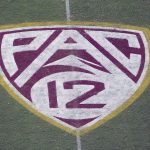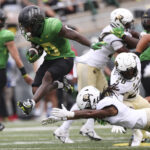Instant reaction to Pac-12 developments on and off the field …
1. Sunday in Seattle
It has been 713 days since Jimmy Lake was named the head coach of the University of Washington football program.
Today could very well be his last.
Lake’s one-week suspension for striking a player ends today, so either the administration must reinstate him to the post or announce a permanent separation.
All indications are that he will be fired before sunset. (If we had to guess: two or three hours before sunset.)
There is no way Lake can return to the job — no way he can credibly lead the program, no way he can properly represent the university — after the self-inflicted damage prior to the suspension.
Lake’s fall has been stunningly swift:
— Nobody questioned Washington’s decision to elevate him when Chris Petersen announced his resignation on Dec. 2, 2019.
At the time, Lake was arguably the hottest coaching candidate in the country. A coordinator coveted by Nick Saban. A recruiting machine who turned out one NFL defensive back after another.
Had the Huskies given Lake the stiff-arm and conducted a national search, the fallout on campus and in Seattle would have been severe.
— Yet nobody could have foreseen the season-long meltdown on Montlake that has unfolded in 2021.
The day before the opener, UW fans were planning for a blowout of Montana, an upset of Michigan and a dethroning of Oregon within the division.
Then it all unraveled.
Lake has nobody to blame but himself. He hired the staff that help sink the program. He refused to admit mistakes or learn his lessons. He embarrassed the university with his comments about Oregon. He struck a player during the game and — even worse, in our opinion — proceeded to track the retreating player down and shove him from behind.
(On Saturday, the Seattle Times reported that Lake was allegedly involved in a lockerroom altercation with a UW player in 2019.)
Of course, everything would be forgiven if the Huskies were 8-2 and leading the division. But they’re 4-6 and headed nowhere after a come-from-ahead loss to Arizona State, and Lake’s internal support has vanished.
He can’t recruit. He can’t lead. He can’t be the university’s highest-profile employee.
Unless we’re reading the situation incorrectly, Lake will be the third Pac-12 coach fired this season — but the first terminated on a Sunday.
2. Validation in Corvallis
It has been 1,446 days since Oregon State hired Jonathan Smith to turned around the moribund program.
Thanks to a 35-14 victory over depleted Stanford, the Beavers have become bowl-eligible for the first time since 2013.
In that regard, Smith’s makeover of his alma mater is complete. His deft use of the transfer portal, shrewd staff hires, especially on offense, and stellar merging of playbook to personnel have enabled the Beavers to gain ground relative to division competitors.
North standings in 2017, the year before Smith took over:
Stanford: 7-2
Washington: 7-2
Washington State: 6-3
Oregon: 4-5
Cal: 2-7
Oregon State: 0-9
North standings in 2021:
Oregon: 6-1
Oregon State: 4-3
Washington State: 4-3
Washington: 3-4
Cal: 2-4
Stanford: 2-6
As you can see, the Beavers aren’t done; they still have a chance to win the North.
It’s a three-step process for here:
— OSU must beat Arizona State and Oregon.
— Oregon must lose at Utah
— Washington State must lose to either Arizona or Washington
That’s an unlikely scenario, sure. But who figured any division title scenario would be in play for the Beavers when the season began.
Who figured such a swift turnaround would be possible when Smith was hired that late November day in 2017.
The Beavers clearly have the right coach. Now, they just have to keep him.
3. L.A. story
It has been 1,450 days since UCLA hired Chip Kelly to make the program nationally relevant.
They haven’t reached that point, not yet. But thanks to a 44-20 victory over Colorado on Saturday, the Bruins are bowl-eligible for the first time in Kelly’s tenure.
An ascent that was expected to take one season has instead unfolded over four long, frustrating years. The program is bowling for the first time since 2017, but the end-game remains uncertain.
The Bruins are 6-4, with USC (road) and Cal (home) remaining.
Win both, and the administration could reasonably point to an 8-4 record as a sign of progress and bring Kelly back for Year Five.
But if the Bruins stumble once — and especially if they lose twice — the calculation changes and a coaching switch becomes more likely.
It’s not unreasonable to envision UCLA playing in its first bowl game in four years with an interim coach in charge.
Coincidentally, that was exactly the scenario in place when UCLA went bowling in 2017.
Jim Mora had been fired, Kelly had not yet taken over, and Jedd Fisch was the interim coach for the Cactus Bowl.
4. On track in Eugene
It has been 1,779 days since a Pac-12 team participated in the College Football Playoff.
Oregon hopes to end that drought a few weeks from now, and its prospects for success improved today on three fronts:
— The Ducks defeated Washington State 38-24 to stay on pace for the 12-1 record needed to contend for a berth.
— Oklahoma lost at Baylor, leaving the Big 12 with no undefeated teams. The conference isn’t out of the race, but its path seemingly narrowed substantially. (Oklahoma State might be the best bet.)
— Texas A&M lost to Mississippi, eliminating the ever-so-slight chance that the Aggies could surge into the playoff hunt using a win over Alabama as their primary fuel source.
Oregon cannot presume victories alone will secure a berth. The Ducks must look good along the way to overcome a comparatively weak stretch-run schedule.
5. Showdown in Salt Lake City
It has been 3,790 days since Utah joined the Pac-12.
The Utes have never won the conference championship.
They came close twice, losing in the title game to Washington (2018) and Oregon (2019). And with one more victory — or one loss by Arizona State — the Utes will clinch their third division title in four years.
They weren’t sharp Saturday during a 38-29 victory at Arizona. Too many penalties. Too many breakdowns defensively. More gaffes on special teams.
But we don’t expect to see the Tucson Utes take the field in Salt Lake City next weekend against Oregon. We expect to see the team that pummeled Arizona State and UCLA.
Then again, a loss to Oregon wouldn’t doom the Utes.
In fact, a loss could be better than a win … if the goal is to participate in the Rose Bowl for the first time in program history.
Oregon’s pursuit of a playoff berth adds a layer of complication, and opportunity, for the Utes.
They could reach the Rose Bowl as the Pac-12 champions or through the at-large path. If Oregon wins the conference and jumps into the semifinals, the Utes likely would be invited to the Rose Bowl as the runners-up.
To that end, here are three result scenarios against Oregon to consider:
— Lose to Oregon next weekend, beat Oregon in the conference championship. Result: Utah advances to the Rose Bowl as conference champions (assuming it wins the South by beating Colorado).
— Lose to Oregon next weekend and in the championship game. Result: Oregon’s prospects for the playoff improve, opening the door for Utah to slide into the Rose.
— Beat Oregon next week, lose to Oregon in the conference championship. Result: The worst-case scenario for the Utes, who would knock Oregon out of the playoff with the victory but then get knocked out of the Rose Bowl with the loss.
Got it?
Good. You’ll be quizzed on it tomorrow.
Support the Hotline: Receive three months of unlimited access for just 99 cents. Yep, that’s 99 cents for 90 days, with the option to cancel anytime. Details are here, and thanks for your support.
*** Send suggestions, comments and tips (confidentiality guaranteed) to pac12hotline@bayareanewsgroup.com or call 408-920-5716
*** Follow me on Twitter: @WilnerHotline
*** Pac-12 Hotline is not endorsed or sponsored by the Pac-12 Conference, and the views expressed herein do not necessarily reflect the views of the Conference.
Related posts:

(AP Photo/Ralph Freso, File)
Wilner Hotline: Sun Devils Missing in Action, Week 10 Pac-12 Picks Wilner Hotline – Oregon v Utah Winner, Pac-12 Weekend
Wilner Hotline – Oregon v Utah Winner, Pac-12 Weekend

(AP Photo/Ralph Freso, File)
Wilner Hotline: Latest Pac-12 Bowl Projections
Oregon running back Bucky Irving, (AP Photo/Amanda Loman)
Pac-12 rewind: UW and Oregon dominate, WSU meets the moment, Utah and USC survive in telling Week 4 actionJon Wilner
Jon Wilner has been covering college sports for decades and is an AP top-25 football and basketball voter as well as a Heisman Trophy voter. He was named Beat Writer of the Year in 2013 by the Football Writers Association of America for his coverage of the Pac-12, won first place for feature writing in 2016 in the Associated Press Sports Editors writing contest and is a five-time APSE honoree.